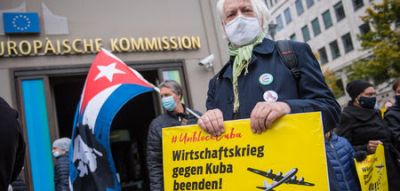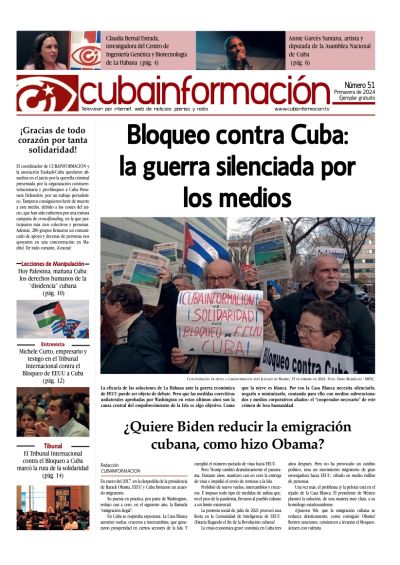Volker Hermsdorf - Original en alemán en Junge Welt - Traducción en español para Cubainformación - El 11 de marzo, el Alto Representante de la UE para Asuntos Exteriores y Política de Seguridad, Josep Borrell, reiteró el llamamiento de la Unión Europea para que se ponga fin al bloqueo económico, comercial y financiero impuesto por Estados Unidos a Cuba desde hace 60 años.
Borrell subrayó explícitamente esta posición en una carta dirigida a los miembros del Parlamento de la UE, que está disponible para jW. Respondía así a las "graves acusaciones" vertidas por un grupo de eurodiputados de derechas contra el embajador de la UE en La Habana, Alberto Navarro.
Los políticos, pertenecientes al Partido Popular Europeo (PPE), a la alianza liberal Renew Europe y al grupo de los Conservadores y Reformistas Europeos, habían acusado a Navarro de firmar una carta dirigida al presidente de Estados Unidos, Joseph Biden, en la que le pedía que levantara el bloqueo a Cuba. Fue "un acto grave y una actuación imprevisible en lo que debe ser la defensa de nuestros intereses y valores", declararon los políticos de la derecha, exigiendo que Borrell "sustituya inmediatamente" al embajador de la UE en Cuba.
El representante de Asuntos Exteriores de la UE convocó entonces a su diplomático a Bruselas a finales de febrero para que presentara un informe y "examinara las alegaciones". A su vez, 25 eurodiputados de los grupos socialista, verde y de izquierdas protestaron por ello, entre ellos Cornelia Ernst, Helmut Scholz, Martina Michels y Özlem Demirel, cuatro de los cinco eurodiputados del partido alemán Die Linke. "No entendemos que la Unión Europea haya convocado al Sr. Navarro a Bruselas para una acción que está en consonancia con la posición oficial de la Unión, sobre todo teniendo en cuenta la ayuda que Cuba y sus brigadas médicas prestaron durante la primera ola de la pandemia en todo el mundo, incluidos los países europeos", subrayaron los parlamentarios en una carta dirigida a Borrell el 2 de marzo.
El jefe de la diplomacia de la UE está ahora de acuerdo en principio con esta línea de argumentación. Navarro le había admitido que "su apoyo a una iniciativa en forma de carta abierta al Presidente de EE.UU. Biden pidiendo el levantamiento de una serie de medidas políticas, financieras y económicas de EE.UU. contra Cuba (...) no formaba parte de sus funciones como representante diplomático de la Unión Europea", escribió Borrell el 11 de marzo "a todos los diputados del Parlamento Europeo que firmaron las cartas sobre la posición del Embajador Navarro". Sin embargo, al mismo tiempo reiteró las decisiones de la UE sobre el bloqueo estadounidense.
El Alto Representante de la UE para Asuntos Exteriores y Política de Seguridad señaló que "el mensaje principal de la carta es coherente con la posición de larga data de la UE, que pide el levantamiento del embargo de Estados Unidos a Cuba". También defendió el "Acuerdo de Diálogo Político y Cooperación UE-Cuba", criticado por los políticos de la derecha de la UE, que en 2017 sustituyó a la "Posición Común" formulada antes por el ex presidente del Gobierno español José María Aznar, que tenía como objetivo el cambio de régimen en Cuba. "El 85% de los eurodiputados de la UE votaron a favor del nuevo acuerdo en julio de 2017", dijo Borrell, desestimando los correspondientes ataques de la derecha.
Este claro compromiso del más alto diplomático de la UE debe ir seguido ahora de medidas más concretas, exige la eurodiputada alemán Özlem Alev Demirel. "En su respuesta, el Alto Representante Borrell admite que el contenido del llamamiento firmado por el embajador se ajustaba a la toma de decisiones de la UE". Dijo que ahora debería dejar clara esta posición también a la administración estadounidense. "Hay que levantar de una vez el bloqueo de Estados Unidos a costa del pueblo cubano", dijo Demirel, como miembro del Grupo de Izquierda y suplente de la Comisión de Asuntos Exteriores del Parlamento Europeo, a Junge Welt.
Carta de Borrell
JOSEP BORRELL FONTELLES
HIGH REPRESENTATIVE
VICE PRESIDENT OF THE EUROPEAN COMMISSION
Brussels, 11/03/2021
A(2021)1452140, 1598291, 1613162, 1586629 and 1659242 Reply_A(2021)1766569
To all MEPs signatories to the letters regarding the position of Ambassador Navarro
Honourable Members of the European Parliament,
Thank you for your letters of 24 February, 2 March, 3 March and 5 March 2021, regarding the professional conduct of the Head of the European Union Delegation to Cuba, Ambassador Alberto Navarro. In view of the serious allegations made, I immediately summoned Ambassador Navarro to Brussels and asked him to present detailed explanations.
Before going into the results of this enquiry, allow me to share some considerations on the complex relationship between the EU and Cuba. In particular, I remain convinced that the approach of the EUCuba Political Dialogue and Cooperation Agreement, and the policy of critical engagement with Cuba that it embodies, is the best way to encourage political and economic reforms, promote democracy and human rights, and improve the lives of the Cuban people. The previous EU stance encapsulated in the EU Common Position of 1996 did not achieve its intended results, which is why the EU took the decision to engage in the negotiation of the Agreement, with the broad support of EU Member States. This approach continues to be seen as the best way to promote the values and interests of the EU in our relationship with the island – a view shared by the European Parliament, with 85% of MEPs voting in favour of the agreement in July 2017. I therefore look forward to continue pursuing this approach with the support of the European Parliament.
As regards Ambassador Navarro’s professional conduct, let me first address his endorsement of an open-letter initiative to US President Biden urging the lifting of a number of US political, financial and economic measures towards Cuba. Ambassador Navarro has acknowledged that it is not within the scope of his functions as a diplomatic representative of the European Union to subscribe to this type of initiative, even less so when they are addressed to the leader of a third country. Without it constituting in any way an excuse for an unwise decision by our Head of Delegation, it should nevertheless be noted that the main message contained in the letter is in line with the EU’s longstanding position requesting the lifting of the US embargo against Cuba. Ambassador Navarro has nevertheless categorically denied having asked or encouraged any diplomatic representative of the EU Member States accredited in Cuba to join in supporting this initiative. He added that all EU Member States’ ambassadors are ready to provide testimony to this as required.
Regarding the hearing organised by the European Parliament Central American Delegation on 19 November 2020, Ambassador Navarro informed us that this event unfortunately coincided with a significant increase in the number of COVID-19 cases in Cuba (43% increase in a week). Under these circumstances, the Delegation was not in a position to receive guests, due to the epidemiological situation. According to Ambassador Navarro, the EU Delegation was nevertheless active in supporting the preparation of the event, including by suggesting potential civil society participants.
In relation to Mrs. Berta Soler, according to Ambassador Navarro, she has been received at the Delegation each time she has so requested. Her last recorded visits before the pandemic took place on 21 April 2017, 11 October 2018 and 15 August 2019. The Delegation also had a virtual meeting with Mrs. Soler on 6 October 2020, in the context of preparations for the third formal EU-Cuba human rights dialogue. The Delegation also maintains regular contact with Mrs. Soler via WhatsApp. Her contributions are very valuable in the preparation of EU human rights dialogues with the Cuban authorities. Furthermore, the Delegation maintains regular and frequent contacts with many other members of Cuban civil society, including human rights activists.
The Delegation’s website has now been updated and includes the Resolution of the European Parliament of 29 November 2019, regarding the arbitrary detention of José Daniel Ferrer and the violation of civil liberties in Cuba. The Ambassador has committed to pay full attention to ensure regular updates, particularly as regards EU positions that concern Cuba.
On the subject of official visits by the European Parliament to Cuba, it is true that only visits by individual members have been possible since 2017. Both the Delegation and the EEAS continue to lobby the Cuban authorities to permit an official visit of the type requested by the European Parliament. I very much regret that the current policy of the Cuban government does not allow such visits but we will continue to make the case that an official visit by the European Parliament would be very much in the spirit of the PDCA. I look forward to working with you to achieve this aim.
Finally, Ambassador Navarro accepts that he misspoke in his reported comments to a Cuban media on the nature of the Cuban political system and in particular deeply regrets his response to the direct question on whether Cuba can be considered a dictatorship. It is clear that Cuba is a one-party regime, where political pluralism and fundamental freedoms are not respected. With this in mind, we will continue our dialogue with the Cuban authorities to encourage their path towards sustainable development, democracy and human rights, in the framework of the PDCA.
Honourable members of the European Parliament,
Serving the European Union and representing it abroad is a high responsibility and we must expect and ask the best from our diplomats. We must also have an understanding for the difficult circumstances many of them are confronted with on a daily basis and act in a proportionate and fair manner when they commit mistakes, bearing in mind, among other things, the actual damage that may have been caused.
There is no doubt that, as pointed out in some of your letters, Ambassador Navarro has committed two major public communication/judgement failures in recent weeks. This is regrettable and he has been summoned to Brussels to present explanations. Ambassador Navarro has admitted his mistakes and presented his deep apologies. The other allegations presented have been, in my view, clarified.
I remain, as always, at your disposal.
Yours sincerely,
Josep Borrell Fontelles











